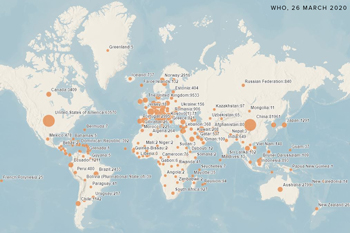
The Australian Academy of Science supports the below statement made this week on behalf of the S20, the science academies of the G20.
The statement’s three key points are that:
- decisions must be based on scientific evidence
- approaches must be international, not national
- beyond the current pandemic, there are similar emergent threats to our future wellbeing for which we must prepare.
It is this Academy’s strong position that responsibility for coordination of an effective international response to COVID-19 must involve scientists and clinicians, who have the skills and experience to provide the best advice on how to minimise the impact of the pandemic. To support scientists, the Academy recently called for .
Science 20 Statement to G20 Leaders on the COVID-19 Pandemic
24 March 2020
On behalf of the Science Twenty (S20) G20 Saudi Arabia engagement group representing the G20 Academies of Sciences, we welcome the Saudi G20 Presidency’s call for an extraordinary virtual G20 Leaders’ Summit this week to advance a coordinated response to the COVID-19 pandemic and its human and economic implications.
The coronavirus pandemic is still unraveling, but its global impact is already staggering. Any hope of a better outcome for this and other similar threats in the future requires evidence-based policies, global collaboration and coordinated actions, and investments in goal-oriented basic and applied research. The unprecedented impact of COVID-19 compels a framework for action that positions science at the core of decision-making.
We, the Science 20, call on the G20 Leaders to fasten policy development and decision making on scientific evidence. Scientific research continues to improve our understanding of the fundamental nature of communicable diseases, as well as its broader connections to risk factors associated with environment, human-animal interactions and socioeconomic considerations. Scientific knowledge is essential for developing strategies for prevention, control and intervention. Epidemiological modeling that assimilates the best science available can guide robust and effective policies to slow and arrest the spread of COVID-19 and to better communicate risk and uncertainty to the public.
The COVID-19 pandemic is also a stark reminder that we are an interconnected world. Our linked existence is the platform for viral spread, yet it is also a major instrument for fighting back. Scientific research is a collaborative enterprise, and it is through cooperation and sharing of accumulated knowledge and best practices that we can impede the unfolding impact of the COVID-19 pandemic and improve future preparedness and response. Sharing real-time information and knowledge will lead to improved strategies and actions for preventing, responding and controlling outbreaks and pandemics. Global cooperation is a must.
Beyond the present crisis, however, lies similar emergent threats to our future health and socioeconomic wellbeing. Whereas our understanding of viral pandemics continues to improve, COVID-19 sadly reminds us that we are far from equipped to prevent and respond to the next outbreaks. We need to build up and fill the gaps in our body of knowledge, and that can best be accomplished through global investment on goal-oriented basic and applied research on viral transmission, prevention and cure. Finally, the knowledge attained through these investments as well as the tools developed to fight back must also be promptly disseminated to benefit medical practitioners and frontline decision-makers.
Science must guide our collective response to COVID-19 and future global health threats. Through your leadership, we as global citizens first and scientists second have the opportunity to alleviate and gradually work together to prevent future outbreaks.
Anas Alfaris, PhD
Chair, S20 Saudi Arabia 2020








